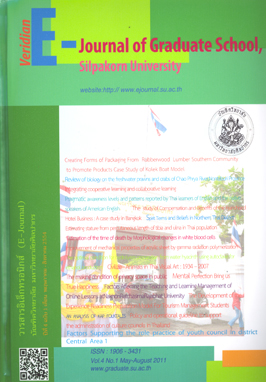American motives behind the Vietnam War: A neo-realist perspective
Main Article Content
Abstract
บทคัดย่อ
ในมุมมองของสำนักสัจนิยมใหม่นั้นเห็นว่าเป้าประสงค์ของสหรัฐอเมริกาในสงครามเวียดนามเป็น เรื่องที่ไร้เหตุผล เนื่องจากสหรัฐฯไม่มีผลประโยชน์ที่แจ้งชัดในเวียดนาม อย่างไรก็ดี บทความนี้ได้แย้งว่าการ จะทำความเข้าใจแรงจูงใจของสหรัฐอเมริกาหลังสงครามเวียดนามนั้นจำเป็นต้องใช้แง่มุมของสำนักสัจนิยม ใหม่ ด้วยเหตุนั้น ขณะที่ลัทธิสัจนิยมใหม่มักอ้างถึงวอล์ทซ (Waltz, 1979) บทความนี้กลับไม่เห็นด้วยกับ วอล์ทซ โดยเฉพาะข้อโต้แย้งของเขาเรื่องระบบสองขั้วอำนาจในช่วงสงครามเย็น ทั้งนี้ความแตกแยกกัน ระหว่างจีน-โซเวียตสามารถมองได้ว่าเป็นการเปลี่ยนขั้วอำนาจ ซึ่งส่งผลโดยตรงต่อยุทธศาสตร์สหรัฐฯใน เวียดนาม ดังนั้นบทความจึงสรุปว่าเจตนารมณ์ของสหรัฐฯเบื้องหลังสงครามเวียดนามได้ถูกวางไว้แล้วโดยโครงสร้างหรือระบบระหว่างประเทศร่วมสมัย โดยเหตุที่ระบบได้จำกัดทางเลือกด้านนโยบายของสหรัฐฯ ทั้ง ๆ ที่สหรัฐฯเองก็มีเหตุจากปัจจัยภายในของตนก็ตาม
คำสำคัญ : สัจนิยมใหม่, สงครามเวียดนาม, นโยบายต่างประเทศสหรัฐอเมริกา, จีน, สหภาพโซเวียต
Abstract
American motives in the Vietnam War, from a realist perspective, were irrational, since the US had no explicit interests in Vietnam. However, this article argues that in order to understand American motives behind the war, neo-realist views must be adopted. Therefore, while applying neo-realism, which mainly refers to Waltz (1979), this article does not agree with Waltz, particularly his argument on the bipolarity in the world during the Cold War. Rather, the Sino-Soviet split can be seen as a change in the polarity, which directly affected the American strategy in Vietnam. Consequently, the article concludes that American motives behind the Vietnam War were shaped by the contemporary international system or structure, since the system narrowed US policy options, despite its domestic factors.
Keywords : neo-realism, Vietnam War, US foreign policy, China, the Soviet Union

